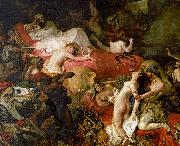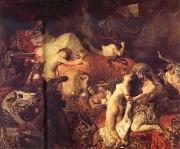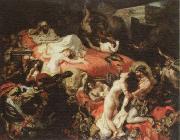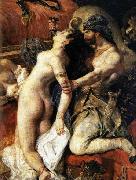Wholesale Oil Painting Reproductions No Minimum and Door to Door! |
|||||||||||
|
|
|||||||||||

|
|||||||||||
|
|
|
||||||||
All Eugene Delacroix Oil Paintings |
||||||||
|
|
||||||||
|
|
||||||||
|
Artist Introduction: French Romantic Painter, 1798-1863
For 40 years Eugene Delacroix was one of the most prominent and controversial painters in France. Although the intense emotional expressiveness of his work placed the artist squarely in the midst of the general romantic outpouring of European art, he always remained an individual phenomenon and did not create a school. As a personality and as a painter, he was admired by the impressionists, postimpressionists, and symbolists who came after him.
Born on April 28, 1798, at Charenton-Saint-Maurice, the son of an important public official, Delacroix grew up in comfortable upper-middle-class circumstances in spite of the troubled times. He received a good classical education at the Lycee Imperial. He entered the studio of Pierre Narcisse Guerin in 1815, where he met Theodore Gericaul |
||||||||
|
|
||||||||
|
The Death of Sardanapalus Painting ID:: 932 |
1827-28
Musee du Louvre, Paris |
|||||||
Height Width |
INS/CM Quality |
|||||||
|
X |
| |||||||
|
|
||||||||
All Eugene Delacroix Oil Paintings |
||||||||
|
|
||||||||
|
|
||||||||
|
Artist Introduction: French Romantic Painter, 1798-1863
For 40 years Eugene Delacroix was one of the most prominent and controversial painters in France. Although the intense emotional expressiveness of his work placed the artist squarely in the midst of the general romantic outpouring of European art, he always remained an individual phenomenon and did not create a school. As a personality and as a painter, he was admired by the impressionists, postimpressionists, and symbolists who came after him.
Born on April 28, 1798, at Charenton-Saint-Maurice, the son of an important public official, Delacroix grew up in comfortable upper-middle-class circumstances in spite of the troubled times. He received a good classical education at the Lycee Imperial. He entered the studio of Pierre Narcisse Guerin in 1815, where he met Theodore Gericaul |
||||||||
|
|
||||||||
|
|
The Death of Sardanapalus Painting ID:: 40037 |
mk155
1827
Oil on canvas
392x496cm
|
||||||
Height Width |
INS/CM Quality |
|||||||
|
X |
| |||||||
|
|
||||||||
All Jacques-Louis David Oil Paintings |
||||||||
|
|
||||||||
|
|
||||||||
|
Artist Introduction: French
b.Aug. 30, 1748, Paris
d.Dec. 29, 1825, Brussels
Jacques-Louis David is famous for his huge, dramatic canvasses of Napoleon and other historical figures, including Oath of the Horatii (1784), Death of Marat (1793) and The Sabine Women (1799). Early in his career he was a leader in the neoclassical movement; later his subjects became more modern and political. David was himself active in the French Revolution as a supporter of Robespierre and is sometimes called the chief propagandist for the Revolution; after the Reign of Terror ended he was briefly imprisoned for his actions. When Napoleon took power David became his court painter and created several grand canvasses of the Emperor, including the heroic Napoleon Bonaparte Crossing the Alps (1801) and the enormous Coronation of Napoleon and Josephine (1807). David also painted Napoleon in His Study (1812), with its famous image of Napoleon with one hand tucked inside his vest. After Napoleon ouster David went in exile to Brussels, where he remained until his 1825 death |
||||||||
|
|
||||||||
|
|
The Death of Sardanapalus Painting ID:: 52466 |
1787 Oil on canvas, 130 x 196 cm |
||||||
Height Width |
INS/CM Quality |
|||||||
|
X |
| |||||||
|
|
||||||||
All Eugene Delacroix Oil Paintings |
||||||||
|
|
||||||||
|
|
||||||||
|
Artist Introduction: French Romantic Painter, 1798-1863
For 40 years Eugene Delacroix was one of the most prominent and controversial painters in France. Although the intense emotional expressiveness of his work placed the artist squarely in the midst of the general romantic outpouring of European art, he always remained an individual phenomenon and did not create a school. As a personality and as a painter, he was admired by the impressionists, postimpressionists, and symbolists who came after him.
Born on April 28, 1798, at Charenton-Saint-Maurice, the son of an important public official, Delacroix grew up in comfortable upper-middle-class circumstances in spite of the troubled times. He received a good classical education at the Lycee Imperial. He entered the studio of Pierre Narcisse Guerin in 1815, where he met Theodore Gericaul |
||||||||
|
|
||||||||
|
|
the death of sardanapalus Painting ID:: 56198 |
mk247
1827,oil on canvas,154.375x195.25 in,392x496 cm,louvre,paris,france |
||||||
Height Width |
INS/CM Quality |
|||||||
|
X |
| |||||||
|
|
||||||||
All Eugene Delacroix Oil Paintings |
||||||||
|
|
||||||||
|
|
||||||||
|
Artist Introduction: French Romantic Painter, 1798-1863
For 40 years Eugene Delacroix was one of the most prominent and controversial painters in France. Although the intense emotional expressiveness of his work placed the artist squarely in the midst of the general romantic outpouring of European art, he always remained an individual phenomenon and did not create a school. As a personality and as a painter, he was admired by the impressionists, postimpressionists, and symbolists who came after him.
Born on April 28, 1798, at Charenton-Saint-Maurice, the son of an important public official, Delacroix grew up in comfortable upper-middle-class circumstances in spite of the troubled times. He received a good classical education at the Lycee Imperial. He entered the studio of Pierre Narcisse Guerin in 1815, where he met Theodore Gericaul |
||||||||
|
|
||||||||
|
|
The Death of Sardanapalus Painting ID:: 62875 |
1827 Oil on canvas Musee du Louvre, Paris The woman writhing at the foot of the royal bed as a dagger is raised to her throat wears an expression of suffering too voluptuous for contemporary taste. Artist: DELACROIX, Eugene Title: The Death of Sardanapalus (detail) , painting Date: 1801-1850 French : historical |
||||||
Height Width |
INS/CM Quality |
|||||||
|
X |
| |||||||
|
|
||||||||
All Eugene Delacroix Oil Paintings |
||||||||
|
|
||||||||
|
|
||||||||
|
Artist Introduction: French Romantic Painter, 1798-1863
For 40 years Eugene Delacroix was one of the most prominent and controversial painters in France. Although the intense emotional expressiveness of his work placed the artist squarely in the midst of the general romantic outpouring of European art, he always remained an individual phenomenon and did not create a school. As a personality and as a painter, he was admired by the impressionists, postimpressionists, and symbolists who came after him.
Born on April 28, 1798, at Charenton-Saint-Maurice, the son of an important public official, Delacroix grew up in comfortable upper-middle-class circumstances in spite of the troubled times. He received a good classical education at the Lycee Imperial. He entered the studio of Pierre Narcisse Guerin in 1815, where he met Theodore Gericaul |
||||||||
|
|
||||||||
|
|
The Death of Sardanapalus Painting ID:: 62876 |
1827 Oil on canvas Musee du Louvre, Paris Artist: DELACROIX, Eugene Title: The Death of Sardanapalus (detail) , painting Date: 1801-1850 French : historical |
||||||
Height Width |
INS/CM Quality |
|||||||
|
X |
| |||||||
|
|
||||||||
|
Prev Next
|
||||||||
|
|
||||||||
|
Related Paintings to Eugene Delacroix :. |
||||||||
|
|
||||||||
|
CONTACT US |






